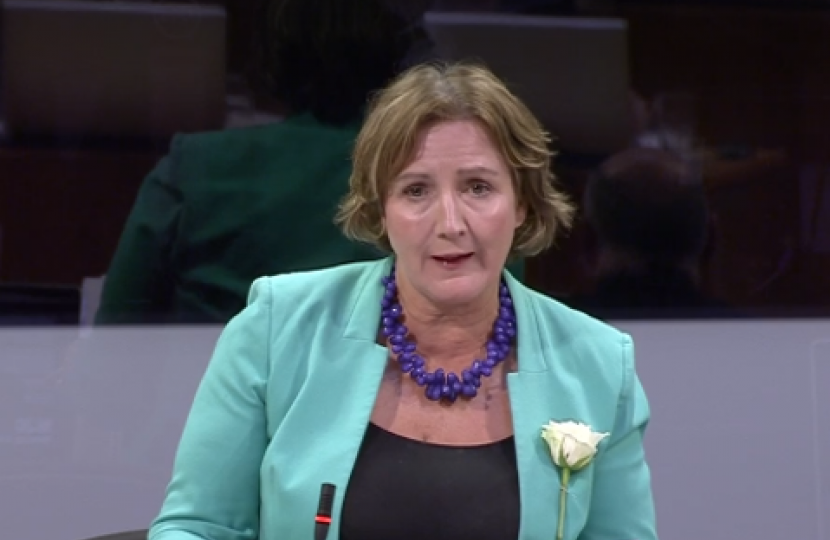
This has been a major week for Welsh Government management of the health services in Wales as the Senedd has seen Mark Drakeford AM, First Minister, and Vaughan Gething AM, Minister for Health and Social Services, scrutinised for lack of progress. Janet Finch-Saunders, Assembly Member for Aberconwy, played a key role in the scrutiny, challenging the First Minister on the 70% increase in the number of assaults on NHS staff, and joining in support of cross-party calls for the resignation of the Minister for Health and Social Services.
Janet said:
“This week has seen the Welsh Government subject to scathing scrutiny about the state of the Welsh NHS.
“I started the examination on Tuesday in Questions to the First Minister by highlighting the horrendous fact that attacks on NHS staff take place on average 10 times every single day, and that there has been a 70 per cent increase in assaults since 2010.
“Staff of all expertise are the back bone of our health service, so it is alarming that on top of the increasing amount of pressure and demands they are having to handle, they are now dealing with an increased threat of risk and violence.
“Clearly, more needs to be done to help staff affected and ensure that they feel safe in undertaking the key front-line services they provide”.
The next day, Janet was joined by a number of cross-party opposition AMs in a vote of no confidence in Vaughan Gething AM, Minister for Health and Social Services. Whilst his Labour colleagues came out to save his position in the Welsh Government, Janet said:
“Staff and patients need to be supported by a Health Minister who is successful at managing health boards out of crisis.
“What the debate on the Minister’s performance highlighted is that a significant number of Assembly Members no longer have confidence in him to address systemic failings.
“This includes me, as I stood up to explain the fact that despite Betsi Cadwaladr University Health Board having been in special measures for almost four years, the longest of any NHS service in the UK, has just recorded the worst A&E waiting times in Wales, had over half the 13,000 people in Wales waiting more than 36 weeks for treatment in February 2019, reported the biggest deficit out of Wales’ seven NHS Health Boards, and many other significant difficulties.
“When considering the failure of the Minister to guide our health board out of special measures, and that two thirds of the health boards in Wales are now in a similar special state, I do believe that the Welsh Government needs to be held accountable for failing NHS staff and patients. Therefore, I called on Vaughan Gething AM, Minister for Health and Social Services, to resign, and if not, for the First Minister to sack him”.
Janet's question to Mark Drakeford, the First Minister, is below:
Question:
First Minister, hospitals at all levels, to include our community hospitals, rely on teams of hard-working staff, who, as you know, are facing an additional increase in pressures. I am really sad to stand here today, though, noting that staff are facing a further challenge. Shockingly, Wales Online has discovered that assaults on hospital staff have reached record high levels in Wales, with attacks taking place on average 10 times every single day. First Minister, there were 3,805 physical assaults against staff reported by Welsh health boards in 2017-18, with this representing a 70 per cent increase since 2010. What action will you take to support those already having been affected by assaults whilst in work, working in our hospitals? And also, how will you support our hard-working front-line health workers from further risks as regards violence, going forward?
Answer:
Llywydd, can I begin by agreeing with what Janet Finch-Saunders has said about the utter unacceptability of people facing assaults as part of their daily work? And those figures are shocking. I think the Member will agree with me that, in part, they are because of the greater willingness of people to report and record those incidents, which previously they may simply have accepted as part of the nature of the job that they do. That was never the right thing. And the actions that have been taken have been supported across the Chamber, to make it absolutely clear that people who work in our NHS deserve to go about the important work they do without the risk of being assaulted by people. It is, we understand, that NHS staff are often dealing with people who are distressed. They can be dealing with people who have problems of mental health, they can be dealing with people who have problems of substance misuse, and sometimes people's behaviour is inherently unpredictable. In those circumstances, staff always, I know, want to work with people to resolve those difficulties. But staff also face difficulties from people who have been drinking, who come in to accident and emergency departments, for example, worse for wear for drink, and, in those circumstances, a zero-tolerance policy towards behaviour that leads to these difficulties is part of the way we deal with it in the NHS. We deal with it with our partners in the police service, with our colleagues in the trade union movement, because reporting, recording and then responding to those incidents is absolutely the way that we want to see those incidents eliminated. (Mark Drakeford AM, Welsh First Minister).


